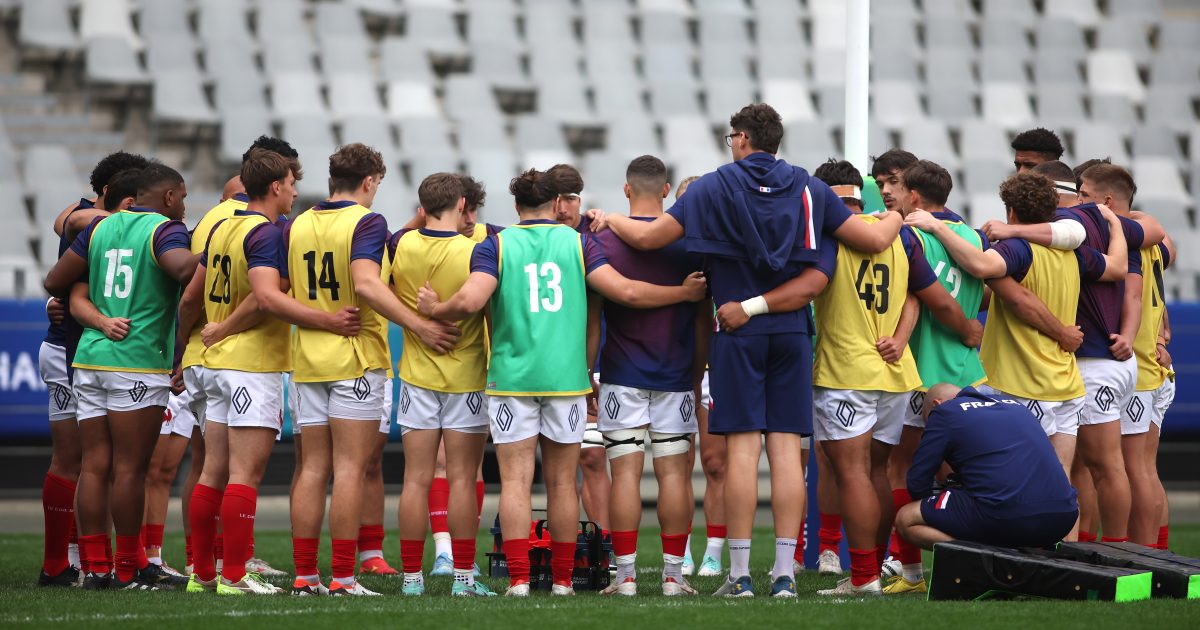Bleuets vs. Baby Blacks: 'We're all eager to play the best game of our lives'

The match against New Zealand on Thursday, July 4, has been on the minds of the French U20 team for a long time. “It’s a first, we don’t know yet if we’re going to play or not”, confesses La Rochelle winger Nathan Bollengier.
“But preparing for a game like this is something we’ve dreamed of since we were kids. There’s a lot of positive pressure, and we’re all eager to play the best game of our lives.”
The opening game of the World Championship against Spain on Saturday, June 29 – which they won 49-12 – did little to reassure the French squad about the group’s cohesion. This year, the team has been under strain, torn between the demands of their clubs (with an increasing number of U20s playing for the senior team) and the expectations of the French national team.
“There were a lot of inaccuracies, a lot of forward passes, and turnovers in the rucks (31). We couldn’t maintain the intensity needed to keep possession and build our game,” admits Bollengier. “But beyond that, there were some interesting moves. When we get our game together, we can do great things. I think we need everyone to be a bit more connected so that we can create a real osmosis and get everyone to give 100% to the line.”
This sentiment is echoed by USAP’s emerging hooker Lorencio Boyer Gallardo. “There was some friction and frustration because we weren’t all able to connect properly, but as the game went on, there were some good moves. We’re trying to find the connections, and little by little, we’re managing to come together and create some play. It was a game that helped us grow,” he said.
Among their strengths, the front-row highlights their set-pieces, particularly the scrum, which had a 100% success rate compared to 85% in the lineout. This contrasts with New Zealand, who were 78% successful in the scrum and 100% in the lineout against Wales.
“In terms of set pieces, especially the scrum, it was really good, we performed well. It’s a strength we need to maintain. We have to be ready for the All Blacks. The lineout was a bit more challenging, but we’ll keep preparing to ensure we’re 100 per cent against them,” said Lorencio Boyer Gallardo.
He himself expects to be on the front line – quite literally – in what promises to be a fierce encounter, if he is selected in coach Sébastien Calvet’s 23-man team.
“The opponents we’re facing are quite strong and powerful, and they utilize a lot of speed in their play, so we’ll need to elevate our performance in that regard. Regarding set pieces, we observed in their recent match that it was a bit 50-50. These are the types of games that really test us. There’s a lot of excitement surrounding it,” he cautions.
The Kiwis, who were more undisciplined with 15 penalties compared to France’s nine in the opening game, will likely engage in self-criticism following their performance against a resilient Wales team side that did not put on the same show as in the last Six Nations, when France won 45-12.
“We’ve been preparing for this game for a couple of weeks now,” said Nathan Bollengier. “It’s a crucial match because it will determine the direction of the rest of the competition. We can’t rely on our performance against Spain; every game is unique.
“Everyone is improving and putting in more effort each day. It’s going to be a significant game. As the coaches emphasize, it’s in the great games that you see great players emerge. We’re all going to elevate our game to deliver the best performance possible.”
France currently leads Pool A on points difference alongside New Zealand. In this competition format, only the top teams from each pool plus the best second team advance to the semi-finals. Therefore, this second match of the championship will play a crucial role in determining the next steps.
















































































